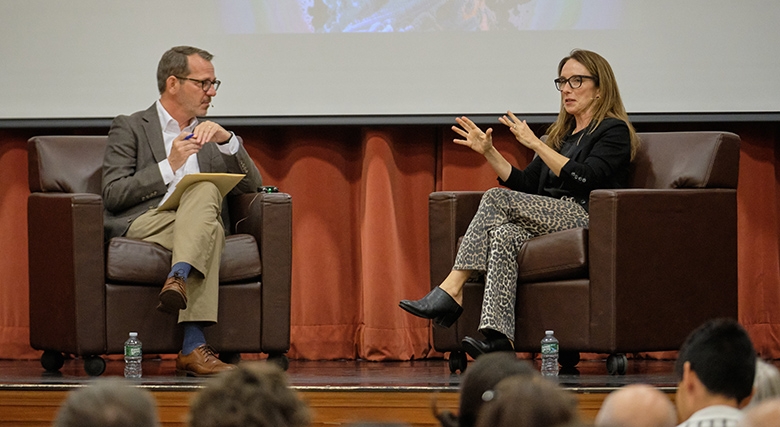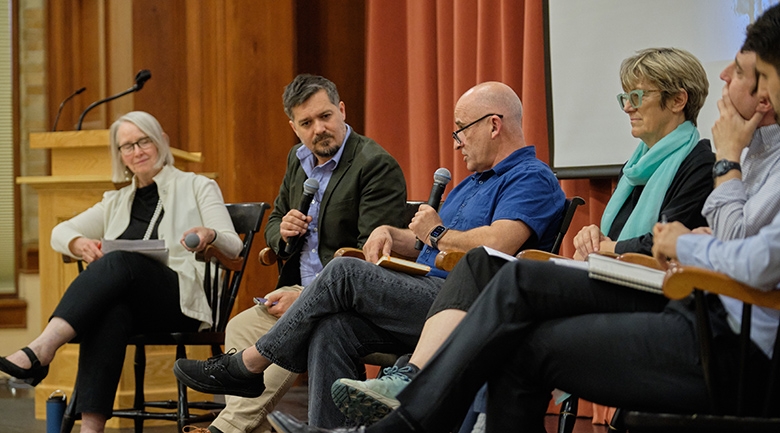Clifford Symposium Explores Impact of AI on Learning, Labor, and Life

Scholars, artists, business executives, technologists, and community members gathered at Middlebury College on September 18-19 for the 2025 Clifford Symposium to discuss strategies for navigating the profound impact of artificial intelligence on education, work, and everyday life.
“This gathering was born from a simple but urgent observation: we are living through a moment of extraordinary technological and social change,” said Amy Collier, associate provost for digital learning, in her opening remarks as head of the Clifford Symposium planning committee. “Though we may not all be here for the same reasons, I believe many of us recognize that the proliferation of AI and generative AI technologies presents deep challenges to the core educational mission of schools like Middlebury.”
“AI Unboxed: Moving Beyond Hype & Fear” began with a conversation between President Ian Baucom and one of his former students from Yale University—acclaimed writer, poet, and New York Times best-selling author Meghan O’Rourke—about the dramatic changes AI is bringing to higher education. Now a professor in the practice, English, and creative writing at Yale, O’Rourke writes about AI including a guest essay in The New York Times, and serves as editor of The Yale Review.
Baucom began by saying he asked ChatGPT what questions the president of Middlebury College should ask Meghan O’Rourke for an upcoming interview. “I’m not working with those questions,” he joked, drawing laughter from the full house assembled in Wilson Hall at the McCullough Student Center. He proceeded to ask O’Rourke a series of his own questions about the use of AI by writers and students, as well as the role of a liberal arts education in an AI-driven era. The two also explored deeper questions such as whether AI-generated content is pastiche and if AI is ushering in an era of the generic.
“The risk side of the equation would be: Can liberal arts education survive in a moment that prioritizes speed, skill, facility, decisiveness? The most predictable answer is that it’s a safe bet,” said Baucom, who suggested that AI’s attributes are making a case for a liberal arts education focused on producing critical thinkers. “Is that just happy talk from a liberal arts college—because of course we’re going to say that’s where we should be—or is there reason to be optimistic,” he asked O’Rourke.
O’Rourke agreed, adding that “as it turns out, a word that is really important to us—one that we don’t talk enough about—is the word ‘meaning.’ Faced with moments of cataclysmic change, where old meanings dissolve, we want to build new ones… we’re sitting in an inflection point where we don’t know what’s coming so we need the liberal arts and the humanities to help us think about and understand that. I really believe that.”
Faculty Grapple with Use of AI in Education
Faculty from a broad range of disciplines served on panels throughout the symposium including “AI in the Middlebury Classroom” where scholars from five departments shared similar struggles with using AI in the classroom and in research. Roberto Lint Sagarena, dean of the faculty and professor of American studies, said the impact of AI varies depending on the major with computer science being the most impacted.
“Any way that we can cushion the ‘future shock’ of AI is something we need to do as well as continue to educate our students about how best to use it… because the train has left the station,” said Lint Sagarena.

Germán Reyes, assistant professor of economics, shared findings from a working paper based on a survey of 634 Middlebury students showing that more than 80 percent of them use AI. Reyes, who co-wrote the paper with Assistant Professor of Economics Zara Contractor, found that students primarily use AI to understand difficult concepts as opposed to having it produce content like writing essays.
“By far, most students said they use AI as more of a personal tutor,” said Reyes. “They use it for other reasons as well like summarizing readings and finding information… but what we learned was that on average 60 percent use it for augmentation uses that improve their learning experience, which to some extent is encouraging.”
Industry Experts and Student Perspectives
Parker Harris ’89, chief technology officer of Slack and cofounder of Salesforce, who also serves on the Middlebury College Board of Trustees, shared his views on workforce displacement, skill development, and opportunities and responsibilities of large-scale AI adoption. Other speakers talked about how AI works technically, its impact on the environment, and how AI and art can coexist. Ian Stewart, executive director of the James Martin Center for Nonproliferation Studies office in Washington, D.C., explained how AI can both threaten and support international peace and security.
Collier led an AI workshop for a first-year seminar class where students discussed what they learned at the symposium. “Students shared reflections on the capabilities and limitations of AI technologies and how these tools are shaping both their education and their world,” she said. “They raised thoughtful questions about their own agency and responsibilities in light of AI’s potential impacts.”
The symposium closed with a community dinner sponsored by the Collaborative on Conflict Transformation consisting of faculty, staff, students, alums, and parents who considered four structured discussion questions.
The annual Clifford Symposium is named after College Professor of History Emeritus Nicholas R. Clifford (1930–2019), who taught history at Middlebury College from 1966 to 1993 and who, in his many years as a member of the faculty and administration, cultivated critical inquiry.

